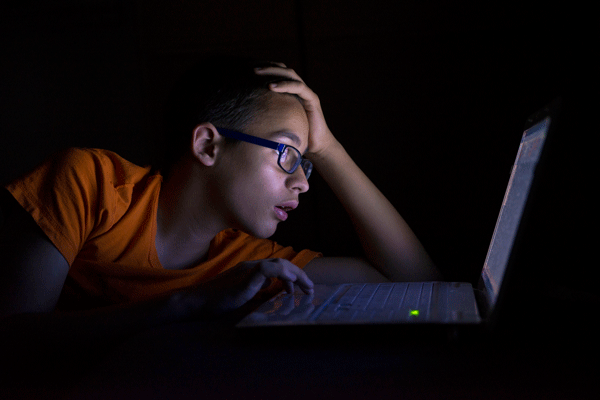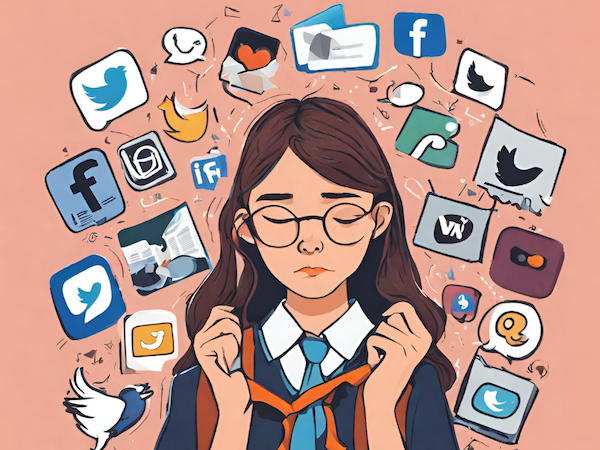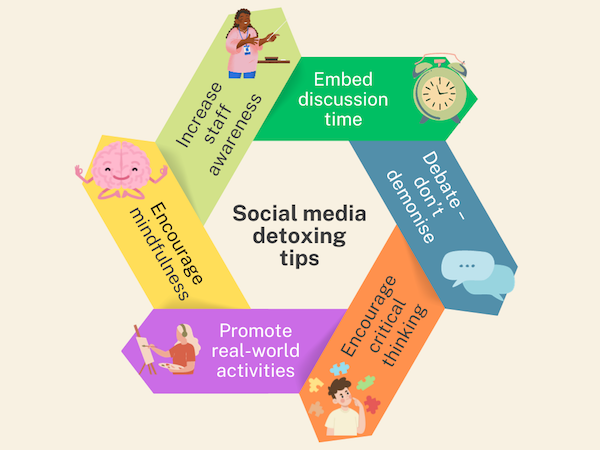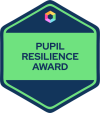In an era dominated by social media influencers and digital distractions, educators face the daunting task of guiding students through the complexities of online content. Zarina Connolly delves into the challenges posed by influential content creators and their impact on students' mental health, offering practical strategies for teachers to foster digital resilience, critical thinking and a healthy balance in students' lives.

The digital landscape is ever-changing. Young people can now access a plethora of wide-ranging narratives and rhetoric on many issues. Educators must develop their understanding of trending social media content. They should help pupils to be discerning in nature but this will require skilful leadership, training and careful planning. Left unattended, schools will likely miss vital opportunities to help pupils manage their online life and behaviours, which may have significant long-term implications for their development.
Short-form content, such as reels, influences and encourages others to adopt their outlook on life. A comparable example might be in the 1990s, when younger audiences would embody their favourite film character, such as Rocky, due to his hero-esque qualities. These influencers are the modern-day movie stars.
However, with the saturation of creators and minimal control of content circulation, altering thought processes and worldviews may not always be net-positive. Pupils are impressionable and consuming these digital materials most definitely moulds their character. In many ways, social media influencers are likely to influence young people more than their parents.

A current topic of conversation concerning social media is famous creator Andrew Tate. Many strongly disagree with his philosophies and how he vocalises his political standpoints or the 'misogynistic' language and attitudes he has espoused. However, it is undeniable that many place him on a pedestal. He is considered a 'role model' by his followers. Therefore, the opinion of his character will likely differ between student and teacher. The anti-establishment bad guy portrayal of Tate will likely drive open discussion about him underground.
It might be enlightening to know that Tate asserts some positive values and principles, such as work ethic and discipline. He is a four-time world kickboxing champion and escaped his impoverished upbringing alongside his brother. This desire to achieve tangible results, affluence and break out of their family's desperate situation is relatable to the discontented youth. Educators must attain a holistic understanding of trending creators and get to the root of why this content is consumed. Making a character or point of view taboo could lead to unintended consequences.
A potential way to address these issues is for teachers to watch the long-formed content, enabling a fairer gauge of its morality and potentially harmful effects. This way, teachers can debate with pupils and pose the counter-narrative. At the same time, we must encourage students to carry out in-depth research and recognise out-of-context content.
New consumers may only view viral/controversial posts, which can distort attitudes and beliefs and veer from the original intent. Teachers have a role to play in encouraging pupils to be more critical of their idols. Teachers should encourage students to assess the transferable knowledge to strengthen their character. In short, help them to use their moral compass to select what they want to emulate carefully and be more critical.
Today, social media also pertains to one's status. These symbols of success often relate to areas such as financial freedom, a desirable physique or the volume of followers. The younger generation will crave attaining it for their own digital validation. Unfortunately, while the resources and freedom to achieve these potential goals are more accessible than ever, many will encounter considerable difficulties achieving them, which may lead to dissatisfaction. This may partly account for the rise in mental health difficulties among young people. Due to the impressionable nature of young people, they may believe the route to these perceived assets is much easier than reality.
Students must understand that many will deceive their audiences and lie about how they achieved what they have. From a young age, the education around these matters should include a deep understanding of the seller-to-consumer relationship online and the digital grooming process. While the content, in the beginning, may be without payment, many content creators cultivate a relationship with their followers to sell something inevitably.
During form time/circle time or PSHE lessons, teachers should explicitly address social media's coercive and manipulative essence, using popular examples. For example, fitness and health gurus will sell programmes or supplements, expressing their faith in these products while not possessing the necessary qualifications or worse, being sponsored by the product. Audiences will struggle to believe they are being lied to when they strongly like their content, which teachers must emphasise.

TikTok is seizing the productivity of our youth. The older generation must understand the draw and correctly compare it to their own Facebook scrolling pastime. The format of the TikTok app deliberately encourages distraction through its clever algorithms. Students have reported hours of lost time watching the uploaded content. It is almost impossible to only watch one 60-second reel on a topic because the temptation to scroll to the next is intoxicating. The attraction is understandable; it is brainless consumption.
A recent 2022 research study found a strong correlation between problematic social media use and anxiety and ADHD symptoms. This pastime has become a welcome distraction for some pupils, another evasion of their responsibilities. For others, it has developed into an addiction.
Content overload can distract the mind from the necessary action they need to take. Young people now have the option to avoid problems and responsibilities literally in the palm of their hands. They can upload the TikTok app for stress relief when cognitive functioning becomes too difficult. Consider this the modern-day equivalent of smoking a cigarette. Teachers must emphasise these potential outcomes and actively promote leading a productive life. These behaviours should be overtly praised. Schools should plan for these slow-drip influences:
Pupils should also be encouraged to self-monitor and be more aware of why and when they choose to open the app.
Often, PSHE and tutor sessions involve little interaction between pupils. Discussions are vital in the fight against the damaging effects of social media use. Waiting for a student to come forward privately about any problems is unlikely to occur. Those struggling to balance their usage or experiencing negative effects of social media, such as online criticism or bullying, can then discover coping mechanisms from their peers.
Supervised dialogue will lead to a wider range of solutions as some teachers may not be aware of suitable digital navigation. Schools I've worked with have also tried other successful approaches, such as enlisting older pupils to advise them on the best way to support younger pupils' online behaviours. Their experience and insights into the social media landscape may offer a neat generational bridge when trying to devise more relevant lessons on managing risks online and finding out the latest trending influencers.
Social media should be considered a passive leisure activity – an addition to life, not the primary outlet for dopamine. While there is merit in some forms of escapism, the pursuit of real-world endeavours should be at the forefront of young people's minds for the sake of their healthy development. For example, sports, performing and creative arts should be made interesting, exciting and accessible. This way, pupils can develop interests and talents in the real world and see tangible results.
I am not advocating the eradication of social media usage but rather strengthening critical thinking skills, self-awareness and the pursuit of activities in the real world. This will, in turn, create balance in pupils' lives. Pupils must hone the skill of time management from a young age. Digital consumption should be part of pupils' lives – not their entire pastime.

 Pupil Resilience Award
Pupil Resilience AwardDigital resilience is just one of the topics covered in our Pupil Resilience Award.
Find out more about building and strengthening resilience, self-belief and confidence in all pupils.
Knowing how to identify and tackle bullying (in all its forms) and exposure to potential extremism and radicalisation is critical. Our new course examines how to help pupils develop critical thinking about social media influences .
